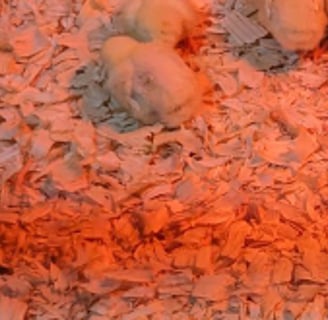Raising Baby Chicks: Our Successes, Failures, and Lessons Learned
2/19/20243 min read


When it comes to raising baby chicks from hatching, there's no denying that it's an exciting and rewarding experience. However, like any new endeavor, there are bound to be some successes and failures along the way. In this blog post, we'll share what we did well, what stunk up, and what we would do differently the next time we embark on this journey. Plus, we'll provide a few tips to help you avoid our failures. So, let's dive in!
What We Did Well
First and foremost, we made sure to provide a warm and comfortable brooder for our baby chicks. We set up a well-insulated box with a heat lamp to maintain the ideal temperature. This allowed the chicks to thrive and grow without any issues.
Additionally, we diligently monitored their water and food supply. We made sure to provide fresh water and a balanced chick starter feed that was appropriate for their age. This ensured that they received the necessary nutrients for healthy growth.
Furthermore, we spent quality time socializing with our chicks. This not only helped them become more comfortable around humans but also allowed us to bond with them. We handled them gently and provided plenty of opportunities for them to explore and exercise.
What Stunk Up...Literally!
Despite our best efforts, there were a few things that didn't go as planned during our chick-raising journey. One of the biggest challenges we faced was dealing with pasty butt. This is a condition where feces stick to the chick's vent, blocking their ability to defecate. It can be quite dangerous if not addressed promptly.
To prevent pasty butt, we learned the hard way that we needed to regularly check the chicks' vents and clean them if necessary. We also adjusted their diet to include probiotics, which helped regulate their digestive system and reduce the occurrence of this issue.
Another mistake we made was not providing enough space for the chicks as they grew. Initially, the brooder seemed spacious enough, but as the chicks got bigger, it quickly became overcrowded. This led to stress and even some aggressive behavior among the chicks.
In hindsight, we should have anticipated their growth and planned for a larger brooder or transitioned them to a bigger coop sooner. This would have allowed them to move around more freely and prevented any negative consequences of overcrowding.
What We Would Do Differently
Reflecting on our experience, there are a few things we would do differently the next time we raise baby chicks. Firstly, we would invest in a more reliable heat source. While the heat lamp worked well for the most part, there were a few instances where it malfunctioned and caused a sudden drop in temperature. This was stressful for both us and the chicks.
Next, we would introduce the chicks to the outdoors earlier. We realized that by keeping them indoors for too long, they became overly dependent on us and struggled to adjust to their natural environment. By gradually exposing them to the outdoors, they would have had a smoother transition and better adaptation skills.
Lastly, we would prioritize predator-proofing our coop from the start. Unfortunately, we had a few close encounters with curious neighborhood cats that managed to sneak into the coop. This not only caused distress to the chicks but also put them at risk of harm.
By reinforcing the coop with sturdy fencing and implementing other predator deterrents, we could have avoided these scary situations altogether.
Tips to Avoid Our Failures
Now that we've shared our failures, here are a few tips to help you avoid making the same mistakes:
Regularly check and clean the chicks' vents to prevent pasty butt.
Provide enough space for the chicks to grow and move around comfortably.
Invest in a reliable heat source to maintain a consistent temperature in the brooder.
Gradually introduce the chicks to the outdoors to help them adapt to their natural environment.
Ensure your coop is predator-proof by using sturdy fencing and deterrents.
By following these tips, you'll be well on your way to successfully raising baby chicks and avoiding the pitfalls we encountered.
Remember, raising baby chicks is a learning experience, and it's okay to make mistakes along the way. The important thing is to adapt, learn from them, and continuously improve. Good luck on your chick-raising journey!
